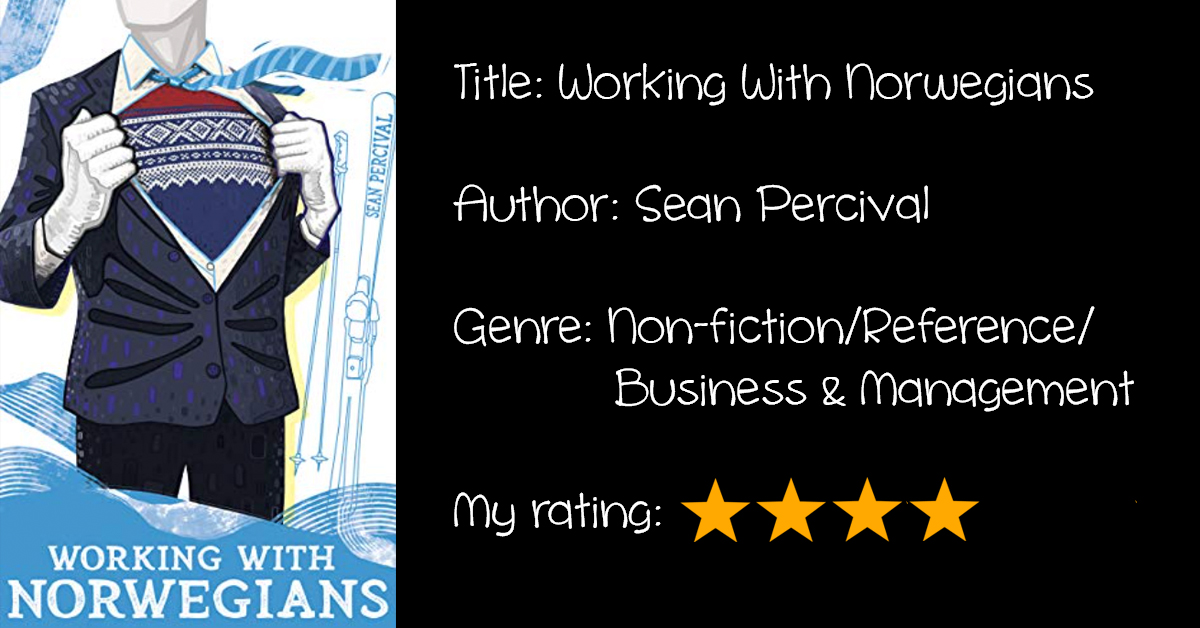Review: “Working With Norwegians”
A jovial recount of an unapologetically American outsider’s view of Norwegian business culture
This was my nineteeth book I chose via the Reedsy Discovery program, for which I am the single approved reviewer for this new book. I have always been intrigued by other cultures, and chose this book to learn more about Norwegians. Its brevity (it can be read under two hours) and easy-to-read style of writing drew me in. This review also appears on Reedsy.
If you’re interested in becoming a Reedsy reviewer (and have the chance to get paid “tips” to review books!) check it out here.
The Premise
After experiencing failure when trying to translate his American work ethic to a Norwegian work culture, venture capitalist Sean Percival collected his thoughts to compile a reference guide for others to avoid making the same mistakes. Touching on some insights about the country’s history and belief system, he explains what makes Norwegians special — which can also make it difficult to work with them, if your own culture has a very different value system. With tips and tricks and a short glossary of terms, Sean outlines what can be done to improve business relations with Norwegians.
Head over to the official website: https://workingwithnorwegians.com
The Pros & Cons
This was a jovial recount of an unapologetically American outsider’s view of Norwegian business culture.
Norway is extremely egalitarian, economically prosperous, largely monopolistic, and known for its high quality of life. Norwegians generally have deep trust in their government, and their systems are greatly unmatched in other countries: they believe in self-care, selflessness, and fairness.
All of that, of course, is a stark difference to the loud, brash, show-off, “me-first” American culture that believes in “Move fast and break things”, a common saying that demonstrates the widespread belief that mistakes are a consequence of innovation in a competitive world.
In terms of business, however, this disparity results in limitations. With so much prosperity, there hasn’t been much pressure to “aggressively go global in business” — particularly when Norwegians seem quite content with the monopolies that exist.
There is also a low risk appetite, as the Norwegian way is to follow the rules:
Breaking the rules, especially in business, is not common in Norway. Those that do, regardless if the outcome is positive for their business, quickly lose respect in the public eye. […] Unlike in America, you’re not likely to get a second chance when your bad behaviour becomes known. The Norwegian’s memory of such bad actors lasts for as long as the fjords are deep.
We gain insight into the reservedness of Norwegian culture, where mindless chatting is frowned upon and the “water cooler culture” simply doesn’t exist. Even greeting someone exuberantly would garner suspicion and discomfort, and long stretches of silence are not rude, as they would be across the ocean.
There were other useful pieces of information about clothing, business vernacular, appropriate gifts, and attitudes to sexual relationships, as well as the only arena where Norwegians are known to “let loose” — drinking alcohol. Most importantly, Norwegians believe in “The Law of Jante”, which are cultural values that encourage Norwegians not to excel above and beyond their peers — quite a conundrum to deal with, from the business perspective of a capitalist, competitive, power-hungry country like the United States.
Fair warning: this is by no means a faithful representation of Norway, so parts may offend some readers. Nevertheless, as someone’s personal experience, a lot of it may ring true, and it would be useful for others to learn from the author’s mistakes. Also, while I enjoyed this book and found the style of writing engaging, it should be noted that it reads as more of a personal business memoir than a veritable guide, so it may not resonate among more diverse readers along the spectrum of race, gender, sexuality, disability, etc. or to non-American audiences, as other cultures/countries/readers from different backgrounds would also have their own nuances that may clash entirely differently with Norwegian culture.
Conclusion
Overall, I liked this swift, humorous read, and I’m glad I took a chance on it. I felt as though I gained valuable insight into Norwegian culture, and a deeper appreciation of Norway’s beautiful, unique, egalitarian society. I would recommend this book to others as a starting point, but note that it is a light-hearted recap to inform and entertain (and it does a great job at that!); by no means should it be the *only* “research” book one reads on the topic. That said, if you’re passing through Norway for a short stint, or perhaps embarking on a business venture with a Norwegian on your own soil, this book will save you in a pinch!
Purchase your copy
Head over to the official website: https://workingwithnorwegians.com
Also available on Amazon:








